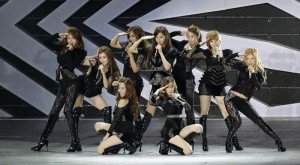By NATASHA IMAN
alltherage@thestar.com.my
WHEN you think of ushering in the new year in Tokyo, you would automatically think: parties, fireworks and endless crowds of people, right? This music addict? I ended up in front of my television screen at home watching Kohaku Uta Gassen, which can roughly be translated as “Red vs White Singing Contest”. This is an annual feature on Japan’s NHK TV station that divides music artistes into two competing teams, red and white, with the red team customarily comprising female artistes and the white team, male artistes.
Within the Japanese entertainment industry it is an incredible honour to be a part of this music programme, as only the most popular acts of the year receive invitations to perform. In fact, appearing on the show for the first time marks a significant point in a singer’s career due to Kohaku Uta Gassen’s popularity and high ratings year after year.
It wasn’t until 1988 that a South Korean singer appeared on the show. Kye Eun Sook, well-known at that time in Japan for her traditional Japanese ballads, appeared on the 39th broadcast of the show and was then followed by female artiste BoA who appeared from the 53rd till the 58th broadcast of the show.
Held on Dec 31, 2011, the 62nd annual Kohaku Uta Gassen show featured three South Korean artistes who have had the most success in Japan: Girl’s Generation, KARA and TVXQ.
Viewership ratings for the show released by Japanese media outlet Sponichi on Jan 5, 2012, had the Girls’ Generation’s performance raking in 39.9% points and KARA, 38.4%. This was seen as an amazing achievement as Japan’s most popular female group, AKB48, only managed 38.9%. And while Japanese boyband SMAP had the night’s most viewed performance with 42.6%, Korean boy group TVXQ came quite close. It was the third time that they had been invited on the show, showing beyond doubt their immense popularity in Japan.
With the K-pop scene growing larger than ever in Japan, we were naturally expecting to see more Korean artistes on Japanese TV in 2012 – but then rumours began to spread in the middle of the year that K-pop artistes may not be allowed on air due to the renewed territorial dispute between South Korea and Japan over the Liancourt Rocks (aka Dokdo Island in Korean and Takeshima Island in Japanese). The longstanding issue heated up when South Korean President Lee Myung-Bak visited the Liancourt Rocks on Aug 10, the first South Korean president to ever do so.
Amidst rumours and speculation, a representative of the Japanese Broadcasting Corporation (NHK) released this statement: “Following the Dokdo incident, there have been more and more Hallyu stars that have begun stating that ‘Dokdo is ours’. Considering this, (Japanese) viewers might have ill feelings about K-pop stars appearing (on Kohaku Uta Gassen).”
Then came the announcement that the biggest year-end music festival in Japan would not be featuring any Korean artistes.
NHK also said that the territorial dispute had nothing to do with the selection of artistes and everything to do with the low popularity scores that Korean artistes had received in 2012, contradicting a statement it had issued prior to the announcement of the 2012 performers’ list.
This isn’t the first time that political differences have affected the K-pop scene. Famous Hallyu star Kim Tae-Hee was harshly criticised in Japan in 2011 after her political activities came to light. It seems that six years ago she had handed out CDs in Switzerland in support of Korean ownership of the Liancourt Rocks. This resulted in over 20,000 people signing a petition in 2011 demanding the cessation of the Japanese drama, 99 Days With A Star, in which Kim co-stars.
It is obvious that the South Korean entertainment industry is suffering in Japan due to the strained political relations between the two countries. Certainly, the fact that NHK decided not to invite any Korean artistes to participate in its year-end music programmes only underlines this. It has also left many people wondering whether or not politics should have anything at all to do with the entertainment industry.
It remains to be seen if politics will take a further toll on the K-pop industry in Japan beyond television. After all, KARA’s New Year’s concert at Japan’s biggest concert venue, the Tokyo Dome, went off without a hitch and it looks like the Girls’ Generation Japanese concert tour of 2013 is still on.
With the enormous popularity South Korean groups enjoy in Japan, it is hard to believe that a political dispute might create a total blackout. Still, with reduced appearances on Japanese television, only time will tell whether Korean artistes can maintain their level of fame and compete against their Japanese counterparts, who are free to promote themselves throughout Japan without any restrictions.


Tell us what you think!